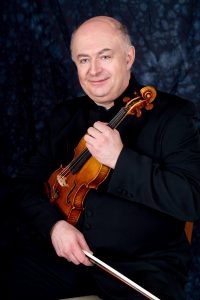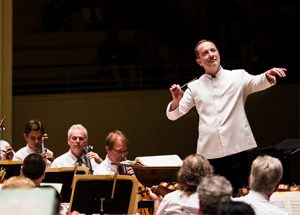
One might expect Ilya Kaler’s sheet music for the Brahms Violin Concerto to be covered in markings from the dozens of performances the violinist has given over the years. Instead, the ink on his part is probably quite fresh.
“Every time I approach a piece that I’ve played before, I prefer to get new music for it,” Kaler said. “(I get) a completely clean part, and the score, and imagine that I’ve never heard it, which is of course not possible. But I try to see things that, before, I didn’t think were important.”
On Thursday, June 28, Kaler will join the Chautauqua Symphony Orchestra and Music Director Rossen Milanov for the CSO’s opening performance at 8:15 p.m. tonight in the Amphitheater. The program will feature Antonín Dvořák’s Symphony No. 9, “From the New World” and Kaler performing Brahms’ Violin Concerto.

The concerto performance will be both a collaboration and conflict between Kaler and the CSO. A collaboration, of course, because they will be on stage making music together, but the Brahms Violin Concerto presents a number of challenges that pit the soloist and orchestra against each other.
“One (challenge), to put it simply, is just being heard,” Kaler said in a 2009 interview with the Chicago Classical Review. “The concerto is scored very richly and with the violin almost in the same register as strings and woodwinds and so forth, that requires a certain level of sound projection.”
Kaler will also have to perform roles unusual for a soloist — Brahms wrote sections in which solo part deviates from melody toperform an accompanimental or textural role.
“I would say (the violin soloist) is the first among the equals,” he said. “Some people thought it was written against violin and orchestra, rather than for (violin and orchestra).”
In the 1980s, Kaler had an impressive streak of firsts at the world’s major violin competitions, winning gold medals at the Paganini, Sibelius and Tchaikovsky competitions. He’s now the only living violinist to have three such medals.
Kaler’s teaching career is equally as distinguished; he’s been on faculty at the Peabody Conservatory, the Eastman School of Music, Indiana University’s Jacobs School of Music. In the fall, he will begin as a full-time faculty member at the Cleveland Institute of Music. He’s also on the violin faculty at Chautauqua Institution’s Music School Festival Orchestra.
Unsurprisingly, he has high expectations for his students.
“(Students) sometimes think that just learning notes and playing them beautifully with perfect intonation and good tempo and so forth would be sufficient,” he said.
Not for Kaler — even his clean-part routine is only one aspect of his preparation for tonight’s performance.
He’s been building a wealth of knowledge and understanding that has developed his understanding of the Brahms concerto over his whole career.
“I think it’s very important to read composer’s biographies, and if they are available, letters, which I think is a very interesting way of discovering personality of an artist,” he said.
That personal, deep approach is necessary, he said, because of the nature of music itself.
“(Music) is one of the most important arts because it’s a synthetic art, which means, because of its abstract nature, I think it has an expressive potential that very few other arts have,” Kaler said. “So for great composers, it would take just writing a chord, but to describe the whole gamut of emotions it evokes, it would take even a great writer three paragraphs of words.”
The program’s second half — Dvořák’s Symphony No. 9 — is also a staple of the orchestral repertoire. This concert will be an opportunity for Milanov, in his third season as music director, to display his interpretive style through well-known works. The first part of the CSO’s season contains several concerts in that vein, performing masterpieces like Verdi’s Requiem, Bartók’s Concerto for Orchestra and Shostakovich’s Symphony No. 7.
Several new faces will be joining the orchestra for this familiar repertoire, however — Pedro Fernandez (percussion), Sean Gordon (bassoon), Genevieve Guimond (cello) and Liana Koteva Kirvan (violin) are all beginning their first seasons as CSO musicians tonight.
Christopher Fischer, formerly assistant principal viola, is now the orchestra’s principal viola.
Also joining the CSO for the first time are the Chautauqua Diversity Fellows — Emilio Carlo (viola), Diana Flores (cello), Vijeta Sathyara (violin), Ian Saunders (double bass and Weiyi Shao (violin).




